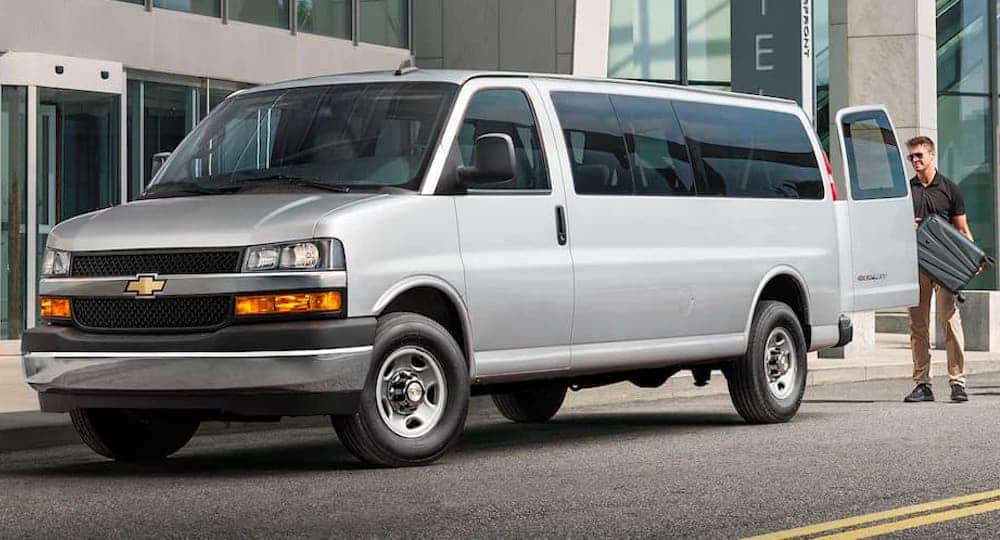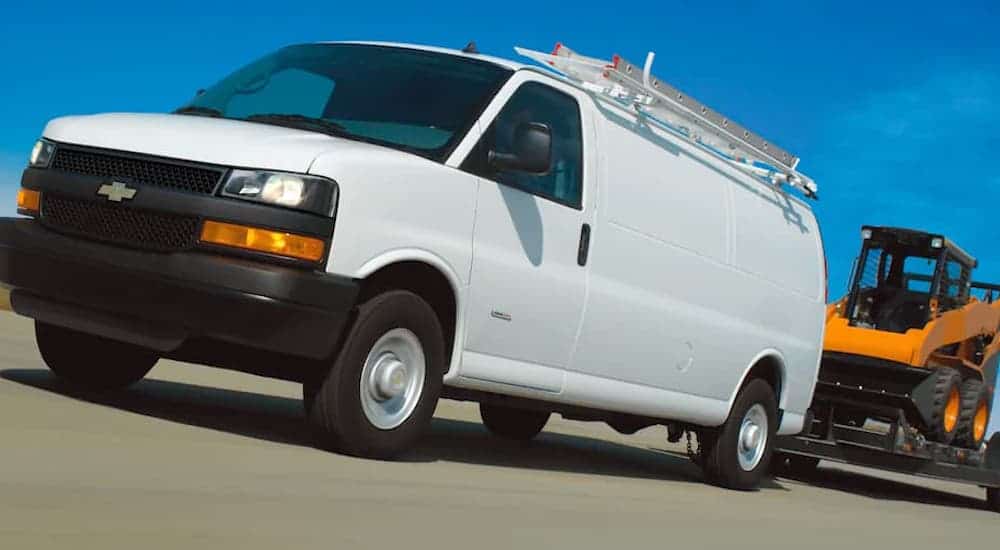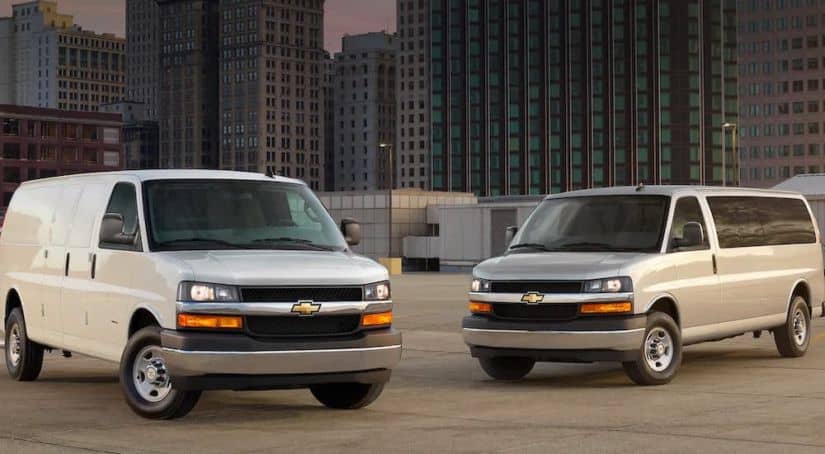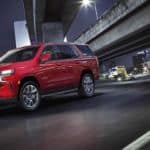We all have work to do, and for many of us, a big part of that work is finding ways to do it faster, easier, smarter, or otherwise better. The concept of kaizen (“continuous improvement”), popularized by Toyota, has infiltrated the working world at every level. Now, we’re in no position to suggest how to structure a Zoom classroom or to discuss the latest developments in optics quality controls, but if there’s a chance that your work could benefit from a workhorse vehicle, we know just the vehicles for the job. Presenting Exhibit A, the 2021 Chevy Express.
There’s plenty of reasons to choose a utility-first vehicle like the Express. Cargo vans simply have more room for “things” than any other class – long stuff, tall stuff, stackable stuff, heavy stuff, an Express can take it all, making it an excellent selection for delivery services. The cargo hold is really like an exceptionally small mobile office, configurable to any need, from specific storage designs to workstations to modest kitchenette layouts. It’s also an exceptional people-mover, with a capacity for up to 15 passengers without upfitting a specialized body.
That being said, the Express is ripe for upfitting, with the chassis cab configuration especially primed for use as a genuine shuttle bus, ambulance, cube van, or ultra-versatile utility applications. With a variety of wheelbases and powertrains, the Express is sized to fit your needs, so it’s no wonder that Chevy has sold over 750,000 of them in the last decade.
All Aboard the Chevy Express
While the primary function of the Express is as a utility/cargo van, let’s start with the van’s impressive secret identity. Replacing the rear panels with windows and filling the cargo hold with seats makes the Express one of the largest standard people-movers on the road. The base Express 2500 passenger van starts at $36,400 before destination charges and includes seating for 12 people, with four rows of seats and at least 3 ft of legroom for each. Upgrading to an Express 3500 with an extended wheelbase and adding a fifth row of seats brings the total seating up to 15 for only $38,400 starting. Competitors like Ford and Mercedes cost over $45,000 and $54,000 respectively to deliver the same capacity, far exceeding the Express’s low price.
If you like the Express for its low cost versus Sprinter and Transit as a high-capacity passenger van, you’ll also want to consider the available diesel engine. The 2.8L Duramax is the same engine that can be found in the Chevy Colorado. While EPA numbers aren’t produced for utility vans, on the mid-size pickup, the engine is rated to achieve 19 city and 28 highway MPG. The upgrade costs just shy of $4,000, but if you have plans to put hundreds of thousands of miles on your passenger van, a durable, low-maintenance, high-efficiency diesel engine is the most cost-effective way to go and still costs less than the Ford option.
The passenger van includes rear-seat air conditioning to ensure the comfort of all, and an available 4G Wi-Fi hotspot is offered to keep everyone connected. This can be especially helpful for airport shuttle services whose passengers are likely to be operating on strict data budgets thanks to roaming costs. Last but not least, Chevy also offers a Thule Hitch-Mounted Storage Container accessory to boost cargo capacity by another 13 cu.ft. or 150 lbs, which can be especially helpful if your many passengers are bringing more than just a carry-on.

A Clean Slate, a Blank Canvas
If your needs are more hands-on, however, the Express cargo or cutaway vans will be more appealing. With the removal of all but the front seats in the cargo van, the expanse of the cargo hold becomes apparent, and visions of endless possibilities abound. The space can accommodate objects over 10 ft long behind the front seats, and the extended wheelbase raises that limit to 12 ft. A 52-in clearance between the wheel wells accommodates wide objects, and the 53 ¾-in ceiling gives plenty of vertical space to work in too.
Chevy doesn’t list “cargo volume” in cubic feet for the cargo van, but by our rough calculations, that translates to 203 cu.ft. for the standard wheelbase and 236 cu.ft. for the extended wheelbase. That gives the base Express 35% more cargo room than a 2021 Suburban with all the rear seats folded up. That’s to be expected in a cargo van, but it’s impressive nonetheless.
You have three powertrain options when buying a 2021 Express. We’ve already mentioned the diesel, which is efficient but ultimately underpowered if you expect to make heavy demands of the van. The standard 4.3L V6 engine delivers much more performance at a lower cost. The available 276 hp and 298 lb-ft of torque are stout numbers, and this engine enables the Express to achieve its maximum 4,280 lbs payload capacity (Express 3500 with regular wheelbase). However, the engine is only rated to tow 7,400 lbs.
Most customers choose the V8 alternative. For 2021 the Express gets the relatively new 6.6L V8 introduced on the 2020 Silverado 2500 and 3500 HD trucks. The beefy block puts down 401 hp and 464 lb-ft of torque, numbers worthy of a heavy-duty pickup, and gives a serious boost to the performance of the Express cargo van. While the heavier engine reduces payload capacity compared to the V6 (max 4,090 lbs with the Express 3500 extended wheelbase), it also increases towing capacity to 10,000 lbs, putting it firmly in competition with full-size pickups.
If your needs are truly out-of-the-box, however, the cutaway chassis cab Express is probably the one for you. A range of wheelbases (the standard 139-in and 159-in plus an extra-long 177-in) and duty levels (3500 and 4500) enables greater flexibility in what the van is rated to achieve, including a max payload rating up to 8,920 lbs! Whether your needs are to transport the masses (bus body upfit), to transport a full warehouse and workshop (utility upfit), or just a bigger box (Hicube and Box Truck upfits), there’s a kit to be had which will see to your every need.

Simple and to the Point
One area where the Express is somewhat lacking is in technology. You won’t find a large center touchscreen or a clutter of wheel-mounted controls on the standard Express. Adding Bluetooth connectivity (along with corresponding steering wheel controls) is a low-cost upgrade, as is a CD player and a USB port. The onboard 4G Wi-Fi hotspot is standard, but of course, adding a plan costs extra. The Express is a work vehicle, and it’s very upfront about the fact, getting right to the point of business without distracting infotainment systems.
It also doesn’t overwhelm drivers with active safety features and driver assists that practically operate the vehicle on your behalf. TPMS and a rear-view camera are standard, which is critical for ensuring proper maintenance and delivering decent visibility behind the massive van. In addition to this, proximity warnings in all directions are available, such as Forward Collision Alert and Lane Departure Warning, which come standard on passenger van models in the LT trim. So, there are still plenty of features to keep your driver and passengers safe.
An Expression of Utilitarianism
The 2021 Chevy Express does not overwhelm shoppers with bells, whistles, and flashing lights. It delivers a practical and familiar style with massive potential for doing big things. From moving 15 passengers to hauling over 4,000 lbs worth of 12 ft long objects in a 200+ cu.ft. cargo hold it emphasizes being big enough for all scenarios you could throw at it for a substantially lower cost than the competition. With an efficient diesel engine, a capable standard V6, and a newly upgraded powerful V8, it offers versatile powertrains to suit your needs, whether you’re cutting long term fuel costs or looking to tow up to 10,000 lbs. And don’t forget that every Express cargo van can be upfit with all sorts of equipment packages expertly designed to cater to your specific line of work – a statement which goes double for Express cutaway vans.
That’s because, at the end of the day, the 2021 Chevy Express is designed to be a work truck and little else. That allows Chevy to offer this classic workhorse for a bargain price and with excellent capabilities. Hundreds of thousands of businesses have gotten on board the Chevy Express – so when will you?



